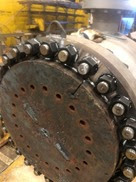Everything You Need To Know About Flange Facing and its Benefits
Everything You Need To Know About Flange Facing and its Benefits
When it comes to the maintenance of flange surfaces, Flange Facing seems to be a perfect solution. With a proper, timely, and maintained repair of flanges, you can help avoid major issues such as corrosion and leakages. This beneficiary service makes sure that the old flanges continue maintaining joint integrity between them.
Why There is a Need for Flange Facing?
A flange
is constantly exposed to continuous wear and tear and is likely to damage due
to impacts and turbulent flow along with other impactful components such as
installation, construction, or cuts from the gaskets leak. With the help of flange facing, you can surface the
flanges in a way that provides them a spiral grooved finish.
This type of finishing allows the flanges to be less prone to any potential leakages such as the liquids and gases are forced to travel through a long and spiral path rather than going straight across the flange face. That’s also the exact reason why flange facings are considered to be one of the most significant repair jobs during maintenance and plant shutdowns.
Which Industry Requires Flange Facing Majorly?
There are several large-scale industries such as petrochemicals, oil and gas, pipeline, pharmaceutical production, and power generation that require flange facing services more than any other industry in the sector.
Internal and Outside Diameter in Mounting – What’s The Difference?
There are two major ways to mount flange facing machines namely ID and OD mounting. In the internal diameter mounting, the clamp legs found inside of the machine are placed properly inside the flange. On the other hand, outside diameter mounting requires the clamp legs to be pushed inside the machine while being externally mounted around the flange.
Applications of Flange Facing – Where is it used?
There are several tasks that can be accomplished with flange facing services. Here’s a quick rundown of several applications of flange facing:
●
Repairing nozzle flanges of heat
exchangers
●
Repairing phonographic finish
and flat face raised flanges
●
Refacing sealing surfaces of
ship hatches
●
Mounting ship thruster, milling,
and drilling
●
Resurfacing housings based on
large pumps
●
Boiler feeding pump flanges
●
Refacing the main inlets of
steam flanges
●
Weld preparing, sealing,
beveling, and facing of the pipe
●
Repairing piston rod mating
flanges
●
Rematching the bearing surfaces
of rotary cranes
●
Milling flanges wind tower
section
●
Plate and vessel weld
preparation
●
Repairing ring grooves and
cutting new grooves
● Rematching the tube sheets with gasket seals
And there’s even a lot more to add to the list. Flange facing services are certainly one of the most important aspects of the industry.
What Range Can You Find Easily?
Based on the skillset of a company, you can find several providers offering portable and highly-durable flange facers that may vary from 0 inches to 60 inches for internal and outer diameters surface mounting. There are some specialized companies that may offer ranges up to 120 inches. A lot of companies also provide tools that have the capability to bevel, square, reface, mill, machine, or counterbore prep or seal ring profiles. Moreover, it also adds up even more to its versatility and helps in converting the single point to milling operations.
Do You Need To Buy or Rent?
Whether you need to buy or rent a tool depends on two major factors. First of all, if you have a regular need of servicing your flanges more often than other industries, buying a tool instead of renting sounds like a more economical solution. Moreover, if you need to deal with different sizes of flanges, you might need to purchase different tools based on different properties to service varying flanges, you will find renting a better solution than buying your own tools. Therefore, you need to constantly analyze the requirements and constraints to determine whether you should buy your own tools or rent them.
The Takeaway
In no doubt, flange facing is a very important service in the industry. As the flanges have to face regular wear and tear, you need to make sure that you’re doing proper maintenance for them. This will allow you to make sure that your flanges last for a longer time.



Comments
Post a Comment